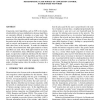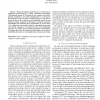1394 search results - page 17 / 279 » On performance limitations of congestion control |
80
Voted
INFOCOM
2002
IEEE
15 years 5 months ago
2002
IEEE
– Typically, NACK-based congestion control is dismissed as being not viable due to the common notion that “open-loop” congestion control is simply “difficult.” Emerging r...
WSC
2001
15 years 2 months ago
2001
Congestion control algorithms, such as TCP or the closelyrelated additive increase-multiplicative decrease algorithms, are extremely difficult to simulate on a large scale. The re...
127
Voted
ISCC
2006
IEEE
15 years 6 months ago
2006
IEEE
Network resource management and control is a complex problem that requires robust, possibly intelligent, control methodologies to obtain satisfactory performance. While many Activ...
95
Voted
COMCOM
2010
15 years 26 days ago
2010
We study the interaction between the MIMD (Multiplicative Increase Multiplicative Decrease) congestion control and a bottleneck router with Drop Tail buffer. We consider the probl...
GRID
2005
Springer
15 years 6 months ago
2005
Springer
— QoS and congestion performance are crucial to good application performance in a utility computing environment. Unfortunately, proper IP QoS setup is very complex and is either ...


